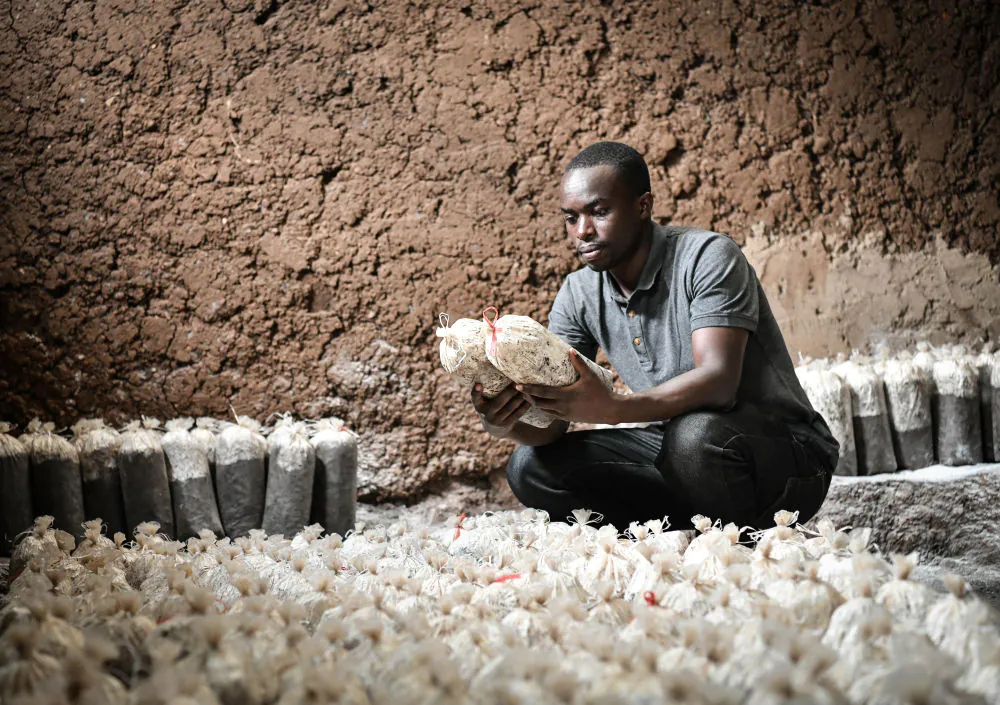

Artykuł partnerski – BEIJING, Sept. 3 (Xinhua)
The 2024 Summit of the Forum on China-Africa Cooperation (FOCAC) is just around the corner.
Themed „Joining Hands to Advance Modernization and Build a High-Level China-Africa Community with a Shared Future,” the summit, the largest diplomatic event hosted by China in recent years, will highlight the common pursuit of China and African countries in realizing modernization.
To support Africa in accelerating modernization, China has launched plans and initiatives focusing on three key areas: industrialization, agricultural modernization and talent development, yielding tangible results.
FUELING AFRICA’S INDUSTRIALIZATION
The three key areas were announced by China at the China-Africa Leaders’ Dialogue in South Africa in August 2023.
Under the Initiative on Supporting Africa’s Industrialization, China is committed to helping Africa expand its manufacturing sector, achieve industrialization, and diversify its economy by channeling more resources, investments, and financing into industrialization programs.
Through market-driven investments, infrastructure development, and ventures in new sectors, Chinese enterprises are enhancing Africa’s industrial system and advancing the continent’s industrialization, according to the latest report by the China-Africa Business Council (CABC).
In Tanzania’s coastal region, Chinese-invested Sapphire Float Glass Factory both serves the local market and exports float glass to six other African nations. With a designed production capacity of approximately 700 tonnes per day, the factory has created 1,012 direct jobs for locals and 3,857 indirect jobs. Inaugurated in September 2023, the project is expected to generate up to 1,650 direct jobs and 6,000 indirect jobs upon reaching full production capacity.
In Botswana, Chinese firms are playing a key role in the country’s green transition efforts. In August, Botswana Power Corporation signed a power purchase agreement with Sinotswana Green Energy, a consortium of Chinese and Botswana companies, to officially launch the nation’s first 100 MW solar photovoltaic power station project.
The project, expected to begin power generation by the end of 2025, was hailed a „key milestone” in the country’s energy transition.
These cooperation projects illustrate the growing role of Chinese companies in bolstering Africa’s industrialization. According to the CABC report, China is diversifying its investments in Africa, covering traditional sectors such as manufacturing, technology, wholesale and retail, agriculture, and real estate, as well as emerging fields like the digital economy, green development, aerospace and aviation, and financial services.
According to the report, titled „China-Africa Investment Cooperation: A New Impetus to Africa’s Industrialization,” this comprehensive investment approach has helped Africa achieve economic diversification and strengthen the resilience and competitiveness of its economies while providing Chinese enterprises with more investment opportunities.
The participation of private enterprises brings not only additional capital and technological support but also more flexible and efficient business models and management expertise, the report stated, adding that over 70 percent of Chinese enterprises investing in Africa are private companies.
BOOSTING AGRICULTURAL MODERNIZATION
Rwandan student Gatera, 31, is currently pursuing a doctoral degree in food crop cultivation techniques in east China’s Anhui Province. Inspired by late Chinese agricultural scientist Yuan Longping, known as „father of hybrid rice,” Gatera applied for a Chinese government scholarship and began his master’s studies at Anhui Agricultural University in 2019.
China cultivates over 17 million hectares of hybrid rice and is ready to share its globally leading cultivation technology with other countries. Dozens of countries across the globe have engaged in research and demonstration planting of hybrid rice, with nearly 8 million hectares planted annually abroad.
„I want to make crops more affordable and accessible to every Rwandan, just as Yuan Longping did,” said Gatera, adding that he aims to develop more heat-resistant crop varieties for his homeland, a landlocked African country facing food shortages.
When asked to comment on the story of the African student, Chinese foreign ministry spokesperson Mao Ning said that China has ensured a secure food supply for its 1.4 billion people after decades of strenuous efforts, and the country deeply understands Africa’s hope for zero hunger.
China has pledged to help Africa expand grain production, encourage Chinese companies to increase agricultural investments in Africa, and enhance cooperation in seed technology and other areas of agro-tech.
Driven by the Plan for China Supporting Africa’s Agricultural Modernization, China-Africa agricultural cooperation has flourished, yielding notable results in technical assistance and training for agricultural experts, the transfer of advanced technologies, the establishment of agricultural parks, and the promotion of farming projects for juncao and hybrid rice. This cooperation has delivered quality rice and vegetables to the African people and advanced the modernization of Africa’s agricultural sector.
Over the past decade, China has established 24 agricultural technology demonstration centers in Africa and introduced more than 300 advanced agricultural technologies, increasing local crop yields by an average of 30 to 60 percent and benefiting over 1 million farmers across the continent.
Currently, over 200 Chinese enterprises are continuing investments in Africa’s agricultural sector, with a cumulative investment stock exceeding 1 billion U.S. dollars. These investments span various areas, including agricultural supplies and machinery, farming, processing, and sales. China is also promoting the development of new business models in Africa, such as smart agriculture, e-commerce, and trade, said Xu Jianping, an official of China’s National Development and Reform Commission, at a press briefing ahead of the summit.
Since 2012, China has sent more than 400 agricultural experts to Africa and trained over 70,000 agricultural technicians for the continent, he said.
China has also announced plans to assist African nations in promoting improved crop varieties and farming techniques, enhancing mechanization and accelerating the increase in the yield of major grain crops.
NURTURING FUTURE TALENT
Tola Tsegaye Alemu, a 34-year-old Ethiopian, first encountered the innovative use of industrial cameras and artificial intelligence to sort coffee beans at the China-Ethiopia Luban Workshop. This technology, provided by China, is set to become a key component of the workshop’s curriculum and could eventually enhance Ethiopia’s coffee industry.
Talent development is vital for both China and Africa as they work to improve their economies and livelihoods, making educational collaboration a cornerstone of China-Africa relations.
Tola Tsegaye Alemu, a vocational teacher from Ethiopia, is pursuing his doctoral degree at Tianjin University of Technology and Education. He is currently a leading instructor at the Luban Workshop in Ethiopia, named after an ancient Chinese craftsman. The workshop is dedicated to equipping African people with valuable vocational skills.
„Luban Workshop is a great opportunity for African young people to learn skills. It not only provides training courses but also unique teaching methods,” said Tola Tsegaye Alemu.
China has established 17 Luban Workshops across 15 African countries, providing training that has helped many African youths secure jobs in Chinese-invested local enterprises and industrial parks.
Under the Plan for China-Africa Cooperation on Talent Development, China plans to train 500 principals and high-caliber teachers of vocational colleges, and 10,000 technical personnel with both Chinese language and vocational skills for Africa every year.
Under robust national support, Chinese colleges and companies are dedicated to training African talent. Fully funded by China Road and Bridge Corporation, Kenyan student Issa Abdirizak pursued a degree in communications engineering at Beijing Jiaotong University. He now works as an assistant communications engineer at Kenya Railways. The Mombasa-Nairobi Railway in Kenya has not only enhanced transportation but also contributed to the development of a new generation of skilled railway professionals.
The scope of China-Africa talent cooperation is expanding from agriculture and infrastructure to digital industries and healthcare, enabling more African youths to pursue their dreams.
Nigerian student Ifeanyi Christian Onyebuchi, who dreamed of becoming a doctor as a child, is studying cardiothoracic surgery at Wannan Medical College in China. Inspired by the work of Chinese medical teams in Africa, he said, „The intelligence and dedication of Chinese doctors, and China’s advanced medical technology have broadened my perspective immensely. I believe with all that, I can become a competent doctor in Nigeria in the future.”
Since 1963, Chinese medical teams have been active in Africa, combating diseases and public health crises. Meanwhile, African students and doctors trained by Chinese medical professionals are becoming a crucial force in improving healthcare across the continent.
To date, China has trained over 220,000 personnel for African countries, tailored to their specific needs. From poverty reduction seminars in Beijing to the establishment of Nigeria’s first transportation university and juncao technology training in Rwanda, China’s educational initiatives are making a lasting impact.
According to a report by the Carnegie Endowment for International Peace, China is the second most popular destination for African students pursuing higher education abroad, after France.
According to Zhang Yongpeng, a researcher at the Institute of West-Asian and African Studies under the Chinese Academy of Social Sciences, as Africa’s Agenda 2063 progresses, the demand for talent will grow, and China-Africa cooperation in this area will continue to deepen. He anticipates that both regions will focus on developing talent in emerging fields like the digital economy, artificial intelligence, and green energy.
„The initiatives to assist Africa in industrialization, agricultural modernization, and talent development are formulated based on China’s own development experience and the actual conditions of African countries. These initiatives align with the current needs of African nations and represent practical measures for China and Africa to jointly advance modernization,” said Wang Lei, director of the Center for BRICS Cooperation Studies at Beijing Normal University.
Over the years, China-Africa cooperation has increasingly highlighted China’s role in helping Africa enhance its own development capabilities, thereby supporting Africa’s efforts toward self-reliance, Wang noted. ■











